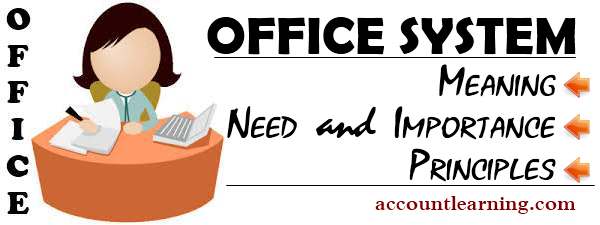Office System | Meaning | Need and Importance | Principles
Table of Contents
Introduction to Office System
An office has its own system to do office work. The reason is that volume of work of an office differ from another. System means a preplanned approach to do the day to day work to achieve the desired objectives of an organization.

According to Terry,
a system is a network of procedures which are integrated and designed to carry out a major activity
Three factors are involved in doing office work. They are persons, forms and equipment. Hence, right types of persons should be selected. The standard forms are used to do the office work very effectively. The selected equipment should be standard one.
Meaning of Office System
Office system means planning of an office work systematically to achieve the main and subsidiary objectives of an organization within minimum efforts and costs.
Definition of Office System
An office system can be defined as an orderly arrangement of whole activities of an office and framing of procedures to be followed for the effective and economic performance of work.
Need or Importance of Systems and Procedures
An office system is based on the nature of work performed and the extent of inter-linking among them. So, office system is required to achieve the following objectives.
1. Improve Operating Efficiency: Office system helps to avoid unnecessary motions there by improve the efficiency in the performance of work.
2. Maintain Uniform Procedure: Uniformity is maintained in the collection of dues from the debtors. Whenever, a default is made by the debtor, the same practice is followed while collecting the amount from them.
3. Optimum Utilization of Resources: The available resources of an office are equipment, (like computer type writer etc.) personnel, space, furniture and the like. These resources are properly utilized for performing office work in a planned and systematic manner.
4. Reduce office Expenses:Unnecessary motions are eliminated and standard automatic equipment and machines are also installed in an office. In this way, the office expense is reduced to some extent.
5. Minimize the Operating Expenses: Standard or maximum limit i» fixed for each and every type of expenses. The actual expenses can be measured and compared with standard». Necessary steps can be taken to minimize the operating expenses, if needed.
6. Fixation of Responsibility: Works are assigned to the office personnel specifically. In this way, the responsibility is fixed for satisfactory performance.
7. Facilitating the introduction of new checks: Sometimes, duty lists can he prepared for office personnel separately and also included in the office manual. This process facilitates the introduction of new check system.
8. Achieving Organization Goals: The performance of any work leads to achievement of organization goals. Here, well designed office system helps to achieve organization goals in a better way.
9. Simplify the training: Office system clearly indicates degree of skill required to do a job. The result is selecting the best training requirements of office personnel.
10. Errors Reduced: A good office system can reduce the chances of errors and improve the overall efficiency of an organization.
11. Smooth Running of an Office: Delays and bottlenecks in the performance of work are reduced with the help of good office systems.
12. Prevention of Fraud: Office system includes internal verification or internal checking. Internal checking assists to prevent the frauds and exercise better control over work.
13. Better Coordination: Coordination is necessary among various sections or departments. The required coordination can be arrived by having good office system.
Principles of an Office System
General principles of office system are listed below.
1. To avoid any interruption in the smooth running of office work.
2. To avoid duplication of work and records.
3. To avoid unnecessary movement of persons.
4. To avoid unnecessary writing.
5. To avoid using unnecessary forms.
6.. To prepare the best use of specialization.
7. To adopt labour-saving machines.
8. To minimize the writing work of the staff.
9. To apply the principle of management by exception
10. To have simple, economic, efficient and practicable system and procedure.
11. To avoid unnecessary checking or verification.
12. To use simple forms to be filled in.
13. To avoid use of machines for personal gains.
14. To increase the efficiency of the office work.
15. To achieve goals at the minimum cost.
The above principles may be kept in mind while framing good office system.
